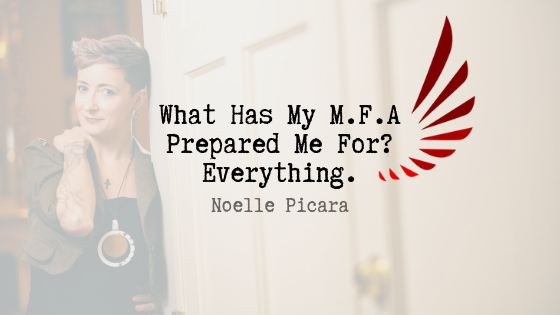How many of us have heard the disdainful question, “What are you going to do with a degree in Fine Arts?” This is indicative of a larger and more fundamental problem with education – the idea that if you do not end up working within the exact industry that you are studying, then the degree is useless. I emphatically disagree. I hold a Master of Fine Arts degree in Creative Writing from Naropa University. And I am not a professional poet. Instead, I work as a performing and visual arts teacher, community engagement advocate, and social justice warrior.
If I had ascribed to the manifesto that an MFA in Creative Writing was not useful unless I was planning on writing poetry professionally, I would have missed out on a plethora of skills that have enhanced my career thus far. Daniel Pink, the author of Drive and A Whole New Mind, says it perfectly when he says that the MFA is becoming the new MBA.
Creative skills cannot be replaced by a computer. They cannot be automated. But these skills that you learn through an MFA are invaluable, qualitative skills that are some of the most marketable ones that you can have. Here are five irreplaceable skills that I learned from my MFA.
Perseverance
Fine Arts degrees do not come easily. They require you to spend an extended period of time creating something out of nothing. You are practicing your chosen discipline every day. Including the days that you feel discouraged or when it doesn’t feel as fun. MFA students learn a special kind of resilience and discipline that breeds a new kind of perseverance: sustainable perseverance that will benefit them in any career and on any project that is thrown their way.
Self-Awareness
The creative arts market is a saturated and competitive one. Before beginning their creative process, MFA students spend time researching the need, how it has been approached before, learning from previous designs, and finally, finding ways to approach the directive differently. For me, that looked like reading classical poetry and finding the most constructive way to introduce my own writings into this established discourse. There is nothing new under the sun, and my MFA has taught me the skills I need to build upon previous solutions and ideas with a fresh approach.
Receiving Criticism
It is impossible to improve in your craft unless you are able to take and digest seasoned critique on your work. MFA students have spent their schooling getting nothing but feedback. By closely studying a specific art, you are opening yourself up to a lot of feedback and you learn how to take that feedback and apply it. It no longer bugs you or gets under your skin; you welcome the feedback because it helps you learn and become a better artist.
Communication
My MFA focuses on creative writing which meant I was writing, a lot. And I use those skills that I developed every day. Although I may not be writing poetry every day, the concepts that I learned equip me to write more engaging marketing material, articles, synopses, and even electronic communication more effectively. I have also learned how to present myself in front of people in an engaging and comfortable way. Prevalent business functions like leading meetings and preparing presentations have not been tough to grasp; they come to me naturally.
Humility
MFA students spend thousands of hours honing their craft and working hands-off in their field. It is an endless road of pushing and challenging yourself to write more elegantly, paint more effortlessly, and dance more rigorously. These times of intense concentration and determination breed humility and the drive that pushes you to succeed. You set an impossibly high standard of success for yourself and it drives you to develop intense precision. This humility and precision will benefit any career that you enter.
I am so grateful that I was able to complete an MFA program and if I had the option to change it, I wouldn’t. My Fine Arts degree has taught me invaluable skills of perseverance, self-awareness, and humility that I would never have learned anywhere else.
So next time someone asks you what you possibly could have learned from an MFA degree, tell them everything. You are prepared for anything and everything.

